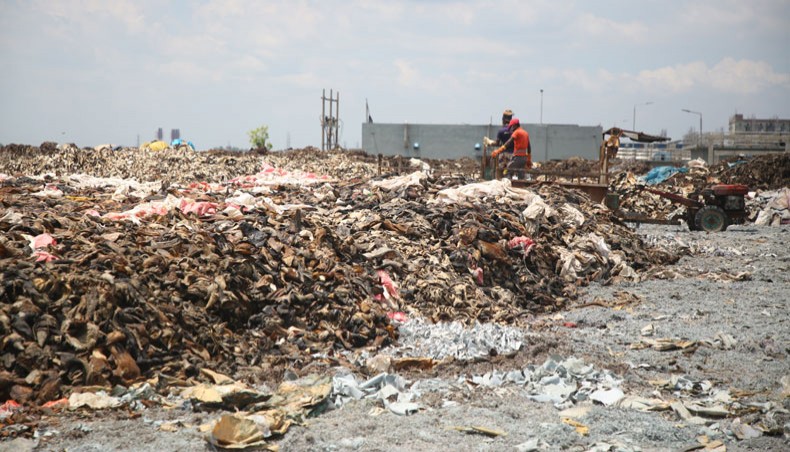The absence of environmental clearance has led the tanneries in Savar, on the outskirts of the capital Dhaka, into a crisis in peak production season as they were unable to get a huge quantity of chemicals released from Chattogram port.
Tanners blamed the Bangladesh Small and Cottage Industries Corporation for the situation, as the latter compelled them to relocate from Hazaribagh to Savar without installing a properly functional Central Effluent Treatment Plant.
The Department of Environment was yet to issue a clearance for the CETP even though the project authorities submitted their application for it in February 2022.
So far, 140 tanneries have relocated to Savar from Hazaribagh, with 81 receiving environmental clearance. DoE officials said that those who received clearance they too had their tenure expired and must renew it now.
Tanners said that due to the environmental issue, a huge quantity of chemicals imported by at least 27 factories was left uncared for in Chattogram port as the customs authorities refused to release them, hampering their operation.
They said that some rawhide, collected during Eid-ul-Azha in July, already got rotten while the quality of some others had fallen as they could not start tanning them on time.
The tanneries have collected about one crore pieces of hides during Eid-ul-Azha, celebrated on July 10, which is 80 per cent of their annual collection.
Bangladesh Tanners Association general secretary Shakawat Ullah said that they were not getting environmental clearance for the failure of the BSCIC.
The BSCIC took the relocation project for two years in 2003 to build an eco-friendly tannery estate in Savar. The park included a CETP to treat effluent generated by leather factories.
The project officials said that the CETP was running out of capacity and inefficient at treating effluent while there was no solid waste management.
Bangladesh Finished Leather, Leathergoods and Footwear Exporters’ Association vice-president Abdul Awal said that the production of tanneries was severely hampered due to the unavailability of chemicals.
‘Hide is decomposing fast due to the high temperatures this year while we are compelled to shut down operations for the lack of chemicals,’ Awal said.
DoE officials said that most tanneries also failed to ensure environmental compliance.
The tanneries use excessive water to treat the same amount of rawhide, resulting in an overflow of the CETP.
Tanners said that they needed over 200 types of chemicals for tanning hides. Most of them are imported from European countries and China.
Of these, sulphuric acid, chromium sulphate, syntans, fillers, biocides, surfactants, degreasers, lime, sodium sulphide, sodium hydrosulphide, caustic soda, ammonium sulphate, ammonium chloride, and formic acid are important.
The Tanners’ Association said that Amin Tannery Ltd, Anower Tannery Pvt Ltd, Apex Tannery Ltd, Ayub Brothers Tannery Ltd, Bay Tannery Unit-2 Ltd, Bengal Leather Complex Ltd, Dhaka Hide and Skin Ltd, Pragati Leather Complex, Reliance Tannery Ltd, and Vulua Tannery Ltd were among the tanneries that had their chemicals left stuck in port.
Association secretary Shakawat Ullah said that all the 27 tanneries imported chemicals under bond facilities.
DoE director Ziaul Haque said they had no choice but to refuse environmental clearance as per the guidelines of the parliamentary standing committee on the environment.
‘As per the guidelines, tanners must renew their licences following environmental compliance,’ he said.
He said that tanneries continued polluting the Dhaleshwari River as the CETP of the tannery estate failed to check pollution.
Tannery owners blamed the BSCIC for getting not just the environmental clearance but also Leather Working Group certification due to malfunctioning CETP.
The Leather Working Group is a not-for-profit community organisation dedicated to driving excellence in sustainable leather production.
LWG certification is a must for tanneries to import their products to top brands.
Mustak Ahmed, managing director of the estate and a deputy secretary of the industry ministry, said that LWG certification mostly depends on the compliance of the industry.
He said environmental management of solid waste and effluent was only a part of that.
Mustak shifted the blame to the tanners for not following compliance issues.
He said tanneries are not operating accordingly, and as a result, pollution goes unabated, which has created an impediment for them to getting DoE and LWG clearance.
As pollution from the BSCIC tannery estate persisted, some tanneries, including Bay and Apex, began to construct their own effluent treatment plants to obtain LWG.













